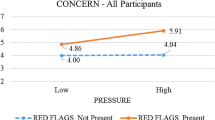Abstract
McNair (1991) discusses the "proper compromises" made by junior auditors in large public accounting firms by arguing that the conflict between high-quality and low-cost auditing leads to "ethically ambivalent" behavior. Specifically, McNair provides evidence that success during the early stages of a public accounting career requires auditors to complete quality audits in an unreasonably short period of time. Completing quality audits within insufficient time constraints puts junior auditors in the following dilemma: report time truthfully and fail versus underreport time and succeed. We reevaluate this conflict approximately one decade after McNair's study and provide evidence that pressures toward "ethical ambivalence" have been reduced in public accounting firms.
Similar content being viewed by others
References
Akerlof, G.: 1970, ‘The Market for “Lemons”: Quality Uncertainty and the Market Mechanism’, Quarterly Journal of Economics (August), 488–500.
Alderman, C. and J. Dietrick: 1982, ‘Auditors' Perceptions of Time Budget Pressures and Premature Signoffs: A Replication and Extension’, Auditing: A Journal of Practice & Theory (Winter), 54–68.
Argyris, C.: 1977, ‘Organizational Learning and Management Information Systems’, Accounting, Organizations and Society 2, 113–123.
Chow, C.: 1983, ‘The Effects of Job Standard Tightness and Compensation Scheme on Performance: An Exploration of Linkages’, The Accounting Review 58, 667–685.
Dirsmith, M. and M. Covaleski: 1985, ‘Informal Communications, Nonformal Communications and Mentoring in Public Accounting Firms’, Accounting, Organizations and Society 10, 149–169.
Gist, W. and R. Davidson: 1999, ‘An Exploratory Study of the Influence of Client Factors on Audit Time Budget Variances’, Auditing: A Journal of Practice and Theory 18, 101–116.
Jansen, E. and M. von Glinow: 1985, ‘Ethical Ambivalence and Organizational Reward Systems’, Academy of Management Review 10, 814–822.
Johnson, E., S. Kaplan and P. Reckers: 1998, ‘An Examination of Potential Gender-based Differences in Audit Managers’ Performance Evaluation Judgments’, Behavioral Research in Accounting 10, 47–75.
Kaplan, S. and P. Reckers: 1993, ‘An Examination of the Effects of Accountability Tactics on Performance Evaluation Judgments in Public Accounting’, Behavioral Research in Accounting 5, 101–123.
Kelley, T. and L. Margheim: 1987, ‘The Effect of Audit Billing Arrangement on Underreporting of Time and Audit Quality Reduction Acts’, Advances in Accounting 9, 221–233.
Lightner, S., J. Leisenring and A. Winters: 1983, ‘Underreporting Chargeable Time: Its Effects on Client Billing, Future Budget Preparation, and Scheduling’, Journal of Accountancy ( January), 52–57.
Magnusson, D. and N. Endler (eds.): 1977, Personality at the Crossroads: Current Issues in Interactional Psychology (Erlbaum, Hillsdale, NJ).
Mautz, R. and H. Sharaf: 1961, The Philosophy of Auditing (American Accounting Association, Sarasota, FL).
Merton, R.: 1976, Sociological Ambivalence and Other Essays (Free Press, New York).
McNair, C. J.: 1991, ‘Proper Compromises: The Management Control Dilemma in Public Accounting and It's Impact on Auditor Behavior’, Accounting, Organizations and Society 16, 635–653.
Pasewark, W. and J. Strawser: 1994, ‘Subordinate Participation in Audit Budgeting Decisions: A Comparison of Decisions Influenced by Organizational Factors to Decisions Conforming with the Vroom-Jago Model’, Decision Sciences 25, 281–299.
Ponemon, L. A.: 1992, ‘Auditor Underreporting of Time and Moral Reasoning: An Experimental Lab Study’, Contemporary Accounting Research 9, 171–189.
Author information
Authors and Affiliations
Rights and permissions
About this article
Cite this article
Buchheit, S., Pasewark, W.R. & Strawser, J.R. No Need to Compromise: Evidence of Public Accounting's Changing Culture Regarding Budgetary Performance. Journal of Business Ethics 42, 151–163 (2003). https://doi.org/10.1023/A:1021965119896
Issue Date:
DOI: https://doi.org/10.1023/A:1021965119896




